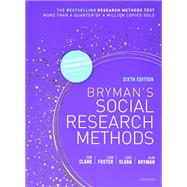Clear, comprehensive, and trusted, Bryman's Social Research Methods has supported over a quarter of a million students through their research methods course and research project. Spanning theory and practice and covering quantitative, qualitative, and mixed methods, this bestselling text offers unrivalled coverage of the whole research process.
The authors have worked closely with lecturers and students in thoroughly updating the sixth edition to reflect the current social science landscape, and carefully streamlining content to make it relevant and appealing to today's students. As a result, the text's comprehensive coverage - which includes many new examples and additional material on areas such as social media research and big data - is now even clearer, more focused, and easier to navigate.
In addition to many new examples of published research, this edition features the insights of a panel of recent graduates from their experiences of researching a variety of fascinating topics, including attitudes towards the LGBT+ community on social media, the experiences of Pakistani Muslim single mothers, and the impact of screen time on sleep. 'Learn from experience' boxes in every chapter contain their candid reflections on the successes and challenges of their projects, and their advice for student researchers.
Digital formats and resources
Bryman's Social Research Methods is available for students and institutions to purchase in a variety of formats, and is supported by extensive online resources.
The e-book offers a mobile experience and convenient access, with learning resources embedded and hyperlinked throughout to offer self-assessment activities and extra support: www.oxfordtextbooks.co.uk/ebooks
The student resources, accessible both online and via the e-book, include:
- Over 300 multiple choice questions
- A 'Research process in practice' simulation
- Student researcher's toolkit
- Answers to the end-of-chapter questions, including audio commentary from the authors
- A flashcard glossary
- Data analysis software tutorials covering SPSS, Nvivo, R, and Stata
- Guidance on using Excel in data analysis
- 'Learn from experience' videos, expanding on the graduate insights provided in the book
The book's teaching resources, accessible online to adopting lecturers, include:
- PowerPoint slides for every chapter
- 250 test bank questions
- 25 seminar outlines
- 75 exam- or coursework-based questions
- Figures and tables from the book








